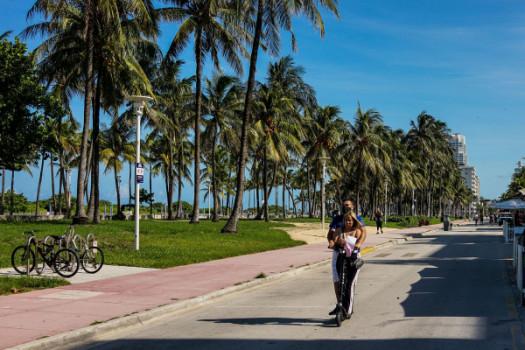
Scooter operators were ordered to retrieve their property or risk impounding

The Miami City Commission has voted to end its multiyear experiment with shared electric scooters. In a four to five vote, the commission approved a “pocket item” (a last-minute legislative maneuver) to end the Miami scooter pilot. The ordinance went into effect at midnight November 18th.
Since 2018, Miami residents and tourists have been able to use mobile apps to rent dockless electric scooters. Companies have until 5PM on Friday, November 19th, to retrieve their scooters from the streets or the city will impound them.
“We’re shutting it down,” said Commissioner Alex Díaz de la Portilla, according to Mass Transit magazine. “That’s it.”
Scooters typically draw some controversy wherever they’re deployed, but the electric two-wheelers were particularly divisive in Miami. Supporters claimed they were useful in reducing car usage and connecting residents to transit hubs. Critics said they were a nuisance, blocking sidewalks and creating situations in which unskilled riders were in danger of being injured in traffic.
“We’re shutting it down”
The scooter companies were incensed by the vote. “We’re extremely disappointed in the Commission’s hasty and short sighted action to end the scooter program, taking away a safe and popular transportation option used by thousands of Miami residents daily and putting dozens of workers out of a job the week before Thanksgiving,” Caroline Samponaro, VP of transit, bike and scooter policy at Lyft, said in a statement.
Samponaro cited recent comments by Miami Mayor Francis Suarez in support of shared electric scooters while speaking at the LA Auto Show. “We are hopeful he will stand up to the Commission on behalf of Miami residents and visitors to stop this action,” she said of the mayor.
Other scooter providers chimed in as well. “It comes as more of a shock to our tens of thousands of riders and the dozens of Miami-based workers we employ whose livelihoods are being toyed with,” Lime Senior Director of Government Relations Phil Jones said in a statement. “We’ve long worked with the City of Miami to provide safe, affordable, and sustainable transportation options for residents and visitors and we’ve invested millions of dollars into our micromobility program here.”
Commissioners who voted to end the pilot claimed to be motivated by safety. “On Biscayne Boulevard, at whatever hour of the day, you see kids on these scooters,” said Díaz de la Portilla, who led the effort to end the program, according to Mass Transit. “This is an accident waiting to happen.”
Other cities have used safety as a pretext for banning scooters. Nashville shut down its e-scooter pilot in 2019 after an intoxicated man was killed by a car driver while riding a scooter. The Nashville pilot was restarted several months later.
Micromobility supporters often point out that cars and trucks, not scooters, pose the biggest threat to people on the road. When someone is injured while riding a scooter or other lightweight vehicle, it is often because cities have done little to protect them, like install protected bike lanes, reduce speed limits, or promote policies to encourage walking, bicycling, and scooter riding. Banishing scooters, they argue, just reinforces the notion that streets are for cars and not people.
Updated November 19th, 1:54PM ET: Updated to include a statement from Lime.








